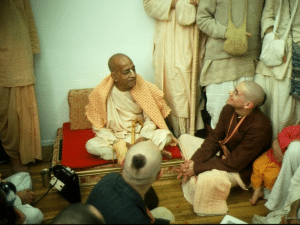"You can send all these alcohol and drug patients here and they will be cured,"
Amogha had arranged a meeting between Srila Prabhupada and representatives
of WAADA (Western Australian Alcohol and Drug Authority). At 10am, four
doctors and staff members arrived at the house, and Amogha introduced them
to Srila Prabhupada.
Mr. Naylor was a social worker, and Dr. Leahy a medical doctor. A young
Buddhist, Mr. Hong Myut, was a clinical psychologist from Burma; Sister Jan
Blanc was a psychiatric nurse. Amogha explained to Srila Prabhupada that
WAADA?s main business was to counsel people who had drug and
alcohol-related problems.
Prabhupada wasted no time in coming straight to the point. ?You can send all
these alcohol and drug patients here and they will be cured,? he said. ?These
American and European boys were all addicted to alcohol and drugs. Now they
have given them up. It is practical.?
Mr. Myut asked about the methods that Prabhupada used to cure these
problems. Prabhupada explained that his conditions were simple. ?I say that ?If
you want to be my students, then you must give up four things: illicit sex, meat-eating, intoxication and gambling?. So they give up, and they become my
students.?
When asked whether they suffer withdrawal symptoms, Prabhupada chose to
quote from Bhagavad-gita. Amogha, hand on the Sanskrit index, read on cue.
?The embodied soul may be restricted from sense enjoyment though the taste
for sense objects remains, but ceasing such engagements by experiencing a
higher taste he is fixed in consciousness.?
Jayadharma read the purport, concluding with the words: ?When one is actually
Krishna conscious, he automatically loses his taste for pale things.? Mr. Myut
wondered whether patients would have to actually take up Krishna conscious
practices to stop addiction. Prabhupada reiterated that it was a practical process.
?It is like a doctor?s instructions,? he said. ?If the patients do not practise, then
how can they be cured??
The well-spoken social worker, Mr. Naylor, asked how long the withdrawal
process took.
?If one lives with us for at least six months,? Prabhupada said, ?he will give up.?
?Six months. And are there any cases of relapse??
?Maybe one in five hundred.?
Mr Naylor was surprised. ?One in five hundred!?
?Of course,? Prabhupada added, ?everyone is prone to fall down. But that
percentage is very low. Even the American government is pleased with this
movement, because they have spent so many millions of dollars for stopping
LSD, and they are surprised that when people come here, they give up.?
?We have about 10,000 students all over the world,? Prabhupada added.
Mr. Naylor was again surprised. ?You mean you have 10,000 students that used
to be addicted to something??
?Yes,? Prabhupada replied, ?addicted to everything?illicit sex, meat-eating,
intoxication and gambling.?
?And those who relapsed, can they be treated again??
?Ah, yes.?
Dr. Leahy wondered if Srila Prabhupada taught his ?patients? abstinence or
moderation.
Prabhupada was frank. ?No, we say ?stop!? We don?t allow even smoking and
drinking tea. That is also intoxication. We are so strict, but still, they give up.
None of us take tea. We eat very simple things: vegetables, wheat, rice, little
milk, that?s all.?
Mr. Naylor was dubious. ?But your method of curing drug addiction has no
definite practical use, surely?? Prabhupada opened his eyes wide. ?Why not practical??
?Well, not everyone who wants to stop taking drugs can spend six months in
solitude or in company like yours.?
Prabhupada explained that it required proper training. ?Then it will be done.
But the influence of association is very strong. Just like if you take association
with drunkards, you become a drunkard. And if you take saintly association,
you become a saint.?
Although Dr. Leahy and Dr. Naylor remained a little aloof, Ms Blanc and
especially Mr. Myut were open and continued to ask submissive philosophical
questions. After some time, Dr. Leahy looked at his watch and the session soon
came to an end.
Afterwards, Ms Blanc expressed her desire to refer people to the devotees but
was disappointed to learn that the Marimba Crescent address was not
permanent. Amogha promised to keep in touch.
Reference: The Great Transcendental Adventure by Kurma Dasa
Recently Added
Trending Today
